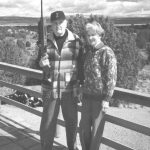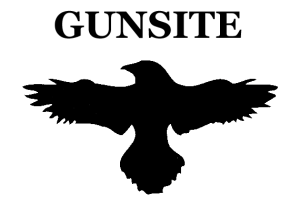
This is part three of an article taken from the ‘Tucson Citizen’ May 1981 by Thom Walker
At the moment, he is testing a new laser-aimed pistol. He aims and a red laser beam cuts through the dusky-lighted gun room. Rifles hang on the knotty-pine paneling, walnut stocks gleaming.
Think about how far lasers have come since 1981.
It does not surprise Cooper to hear law enforcement officials admit that crime is out of control. Police have never been able to stop crime, he said. “They take care of problems afterwards.”
But he is concerned that the breakdown of law and order seems to be accelerating. He sees it as further erosion of American society, a process that he says has been going on since World War II.
The French philosopher Montesquieu foretold it, he said. “When there is no virtue, democracy does not work. We haven’t got it and it’s not working.”
His students generally fall into two categories, Cooper said. Those who’ve recently discovered that the world is a dangerous place and decide to arm themselves. And those who’ve always known that, who’ve always kept guns – and decide to learn how to use them right.
One recent class had eight doctors, and four women. There were no clergymen but frequently there are. Actor James Caan went through the course in preparation for the movie, “Thief,” even though Cooper protested that it would be unrealistic for the “creep” portrayed by Caan to possess Gunsite-style shootiing skills.
Applicants are carefully screened to prevent “bad guys” from attending. “In an old-fashioned sense, we don’t allow people to come here who aren’t respectable people.”
Despite widespread rumors about the place, no “mercenaries” have ever attended the school, Cooper said. neither has any politician.
Cooper is pessimistic about the future of American democracy as it now exists. “I teach weaponry and I am armed whenever I can possibly be, but that isn’t going to cure anything. The cure, if any, has got to come from a political-philosophical restructuring of society.”
Until that happens, he said, “You’re on your own.”
Inside the “Funhouse.”
One of several ranges at Gunsite, this one duplicates a street environment, with dimly lit corridors, side rooms and moveing targets – some armed and threatening, some not. The price for shooting an “inocent bystander” is a bottle of whiskey.
“We want you to make your mistakes on the range – not in the street,” Cooper said. Making a “mistake” does not include shooting a fellow student, he added, pointing out that there has never been a gun accident at Gunsite.
Students go through the Funhouse several times during the course, with the scenario changing and increasing in complexity each time. Leaning against one wall is the target of a T-shirted man with a gun in his hand. On another wall is a poster of television star Eric Estrada, nicked in several places by students’ mistakes.
“Killing is a neutral act,” Cooper said. “Killing for the wrong reasons is an unforgiveable sin. Killing for the right reasons may be heroism. So the act itself is meaningless. It’s only the circumstance under which it takes place.”
For the average homeowner interested only in protecting his family against someone trying to break in, Cooper said the shotgun may be a better choice than a handgun. A handgun is useless, unless you have iton you at the time. “If you have to go into your bedroom to get something, then you’re better advised to get a shotgun.”
For those willing to learn how to use it, Cooper recommends the .45. Its combination of efficiency and stopping power make everything else a second-class choice, he said. A .22 can also stop a fight he added if its owner can keep cool and shoot accurately.
Cooper added that the type of gun you have frequently is less important than your presence, the command of your personality and the tone of your voice. “It’s the old ‘Gunsmoke’ thing. Matt Dillon. You walk in and say, ‘Don’t do anything silly, mister, because if you do you have lost. And you have lost now-w-w…'”
Jeff Cooper leaned back in the chair at his desk in his lookout-like office. From the slit windows, he could look out over a wide, juniper-dotted valley rising toward Black Mesa.
“This is one of the good places,” he said. It was apparent that Cooper has found his kind of inner peace in a place that bristles with guns. He doesn’t recommend it for everyone, but it works for him.
He expects that things will get worse in the world outside Gunsite, until people demand change. The “Revolution of 1980 – as he calls President Reagan’s election – may temporarily reverse the trend, but he is unsure if it will last.
Still, it annoys him that journalists keep planting a sense of helpless fear in society. “Fear” is a dirty word, he said.
“Things have always been out of control,” Cooper mused. The fear of doing something about it is a “damn pantywaist attitude” nurtured by an “epicene era in which there’s not supposed to be any difference between men and women.
“The hell with that,” Cooper said. “It’s the difference between a lion and a lioness. The lioness kills the game and the lion just stands around and sleeps until she brings it in. You know what the lion is for? Hyenas. When the hyenas close in around the kill, the’ll scare the lioness off.
“Then the lion stretches, and Whoosh!” he said, brushing aside imaginary hyenas. “That’s what I do. You girls kill the zebra, and that’s what I do.”
The assumption that America is a civilized country where people are safe from violence is no longer valid, he said. Cooper said he personally feels safer in the forward area of a war zone.
“Because there, I never take off my pistol.”


